An Event in Honour of Red Dress Day with Cambria Harris
May 2, 2024
Cambria Harris
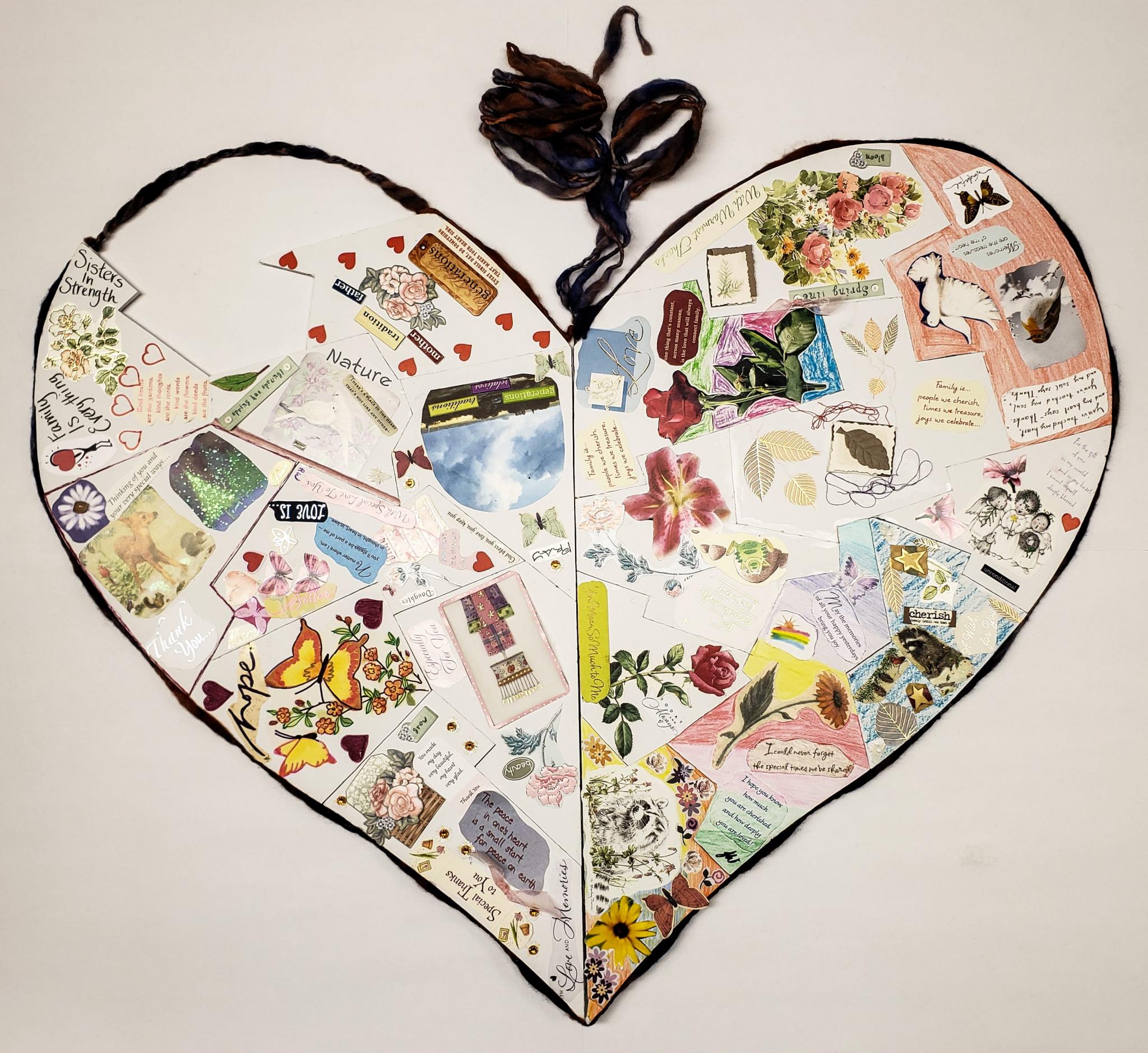
The content in this video may be difficult and/or triggering. If you or someone you know needs emotional assistance related to this topic or the information in this article, help is available 24/7 through the MMIWG Support Line, 1-866-413-6649.
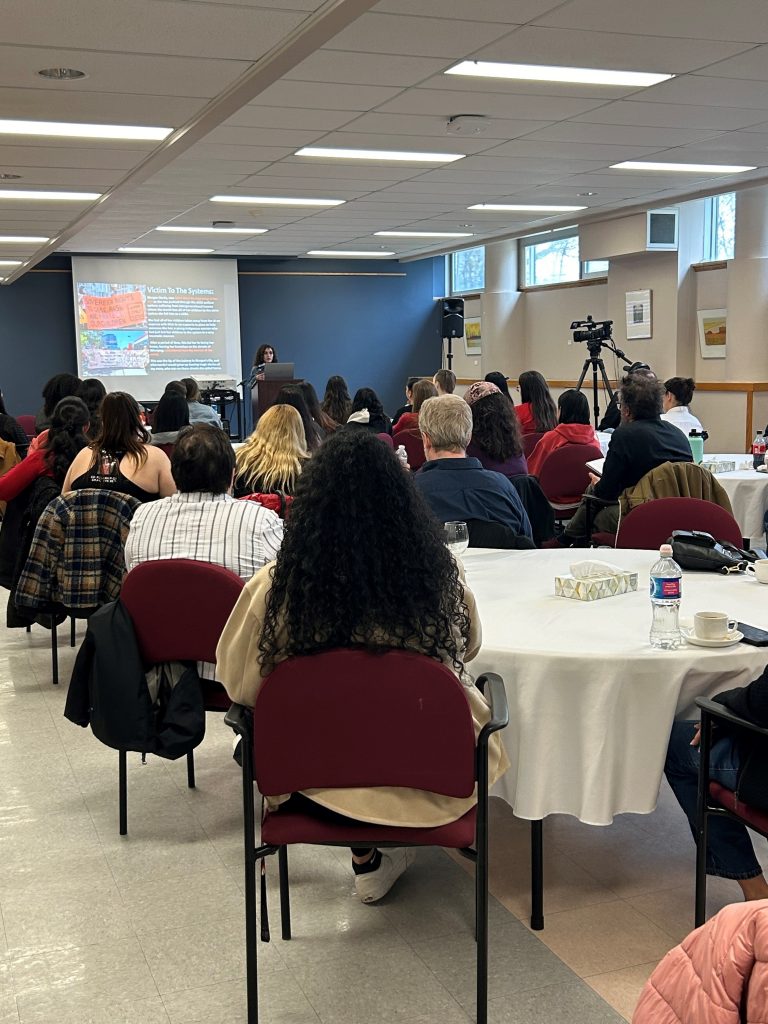
On Thursday, May 2nd, 2024, Indigenous Engagement and Communications, the Department of Indigenous Studies, the Margaret Laurence Endowment Fund (Women’s and Gender Studies) and the Centre for Human Rights Research at the University of Manitoba were honoured to host Cambria Harris for an event in honour of the National MMIWG2S+ Awareness Day, or Red Dress Day.
The name ‘Red Dress Day’ is inspired by the work of Métis artist Jamie Black who began The REDress Project in 2010 to raises awareness about the thousands of missing and murdered Indigenous Women, Girls, and 2SLGBTQQIA+ Peoples. It began as an art installation that hung hundreds of empty red dresses in public spaces to remind people of the First Nations, Métis, and Inuit women and girls lost because of gender-based violence.
Read more about the Calls to Justice.

“The Crying Need For Indian Foster Homes”: Indigenous Women Challenge State Child Welfare Practices With Sarah Nickel, PhD.
"The Crying Need For Indian Foster Homes": Indigenous Women Challenge State Child Welfare Practices With Sarah Nickel, PhD.
March 12, 2024
Dr. Sarah Nickel
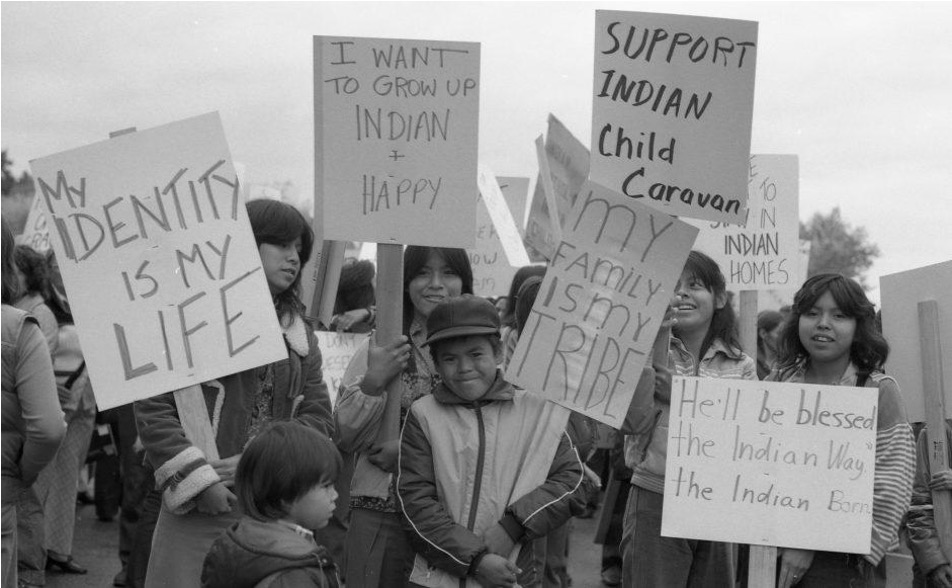
The Centre for Human Rights Research (CHRR) hosted a seminar titled “The crying need for Indian foster homes”: Indigenous Women Challenge State Child Welfare Practices with Dr. Sarah Nickel (UAlberta) on Tuesday, March 12, 2024, at 2:30 pm in 543-544 UMSU University Centre.
Sarah Nickel is Tk’emlúpsemc, French Canadian, and Ukrainian, and an associate professor of History at the University of Alberta. Her work focuses on twentieth century Indigenous politics and the gendered nature of political work drawing on community- engaged methodologies. Her first book, Assembling Unity: Indigenous Politics, Gender, and the Union of BC Indian Chiefs was published in 2019 with UBC Press and won the Canadian Historical Association’s prize for Best Book in Indigenous History in 2020. Sarah’s second monograph, Active Women: Indigenous Women’s Social and Political Work in Kanata’s West will be published with the University of Toronto Press in late 2024.
This seminar is a part of our annual Critical Conversations seminar series. This year, the seminar series focused on the CHRR’s research theme Reproductive and Bodily Justice and explored histories of the body, reproduction, and care in Canada and beyond.

Land and Settler Colonialism in southern Manitoba: A Resource Guide
Land and Settler Colonialism in southern Manitoba: A Resource Guide
November 2023
Dr. Adele Perry, Dr. Shelisa Klassen
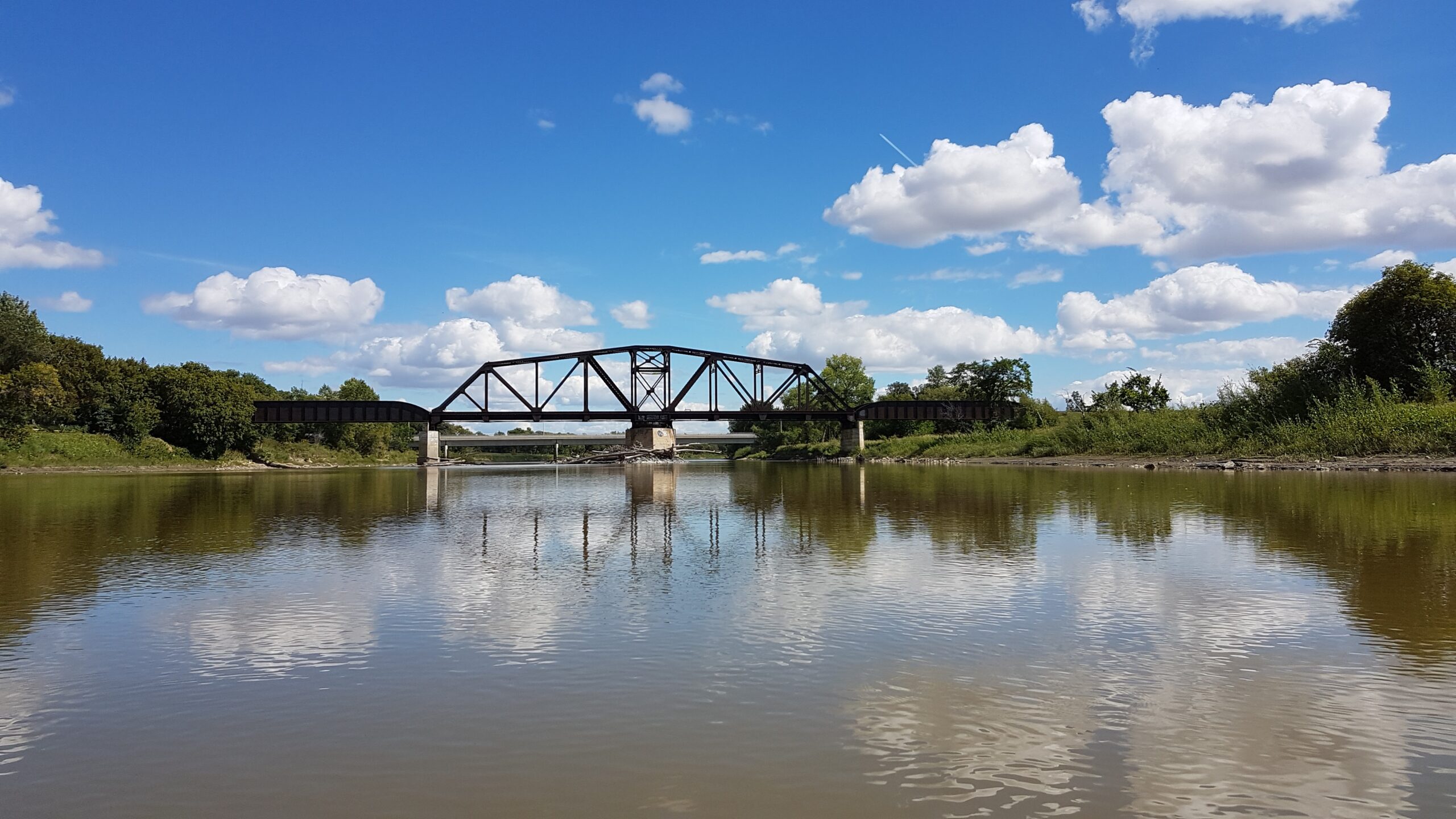
A resource guide to learn more about land and settler colonialism in southern Manitoba.

Debunking the “Mass Grave Hoax”: A Report on Media Coverage and Residential School Denialism in Canada
Debunking the “Mass Grave Hoax”: A Report on Media Coverage and Residential School Denialism in Canada
October 2023
Reid Gerbrandt, Dr. Sean Carleton
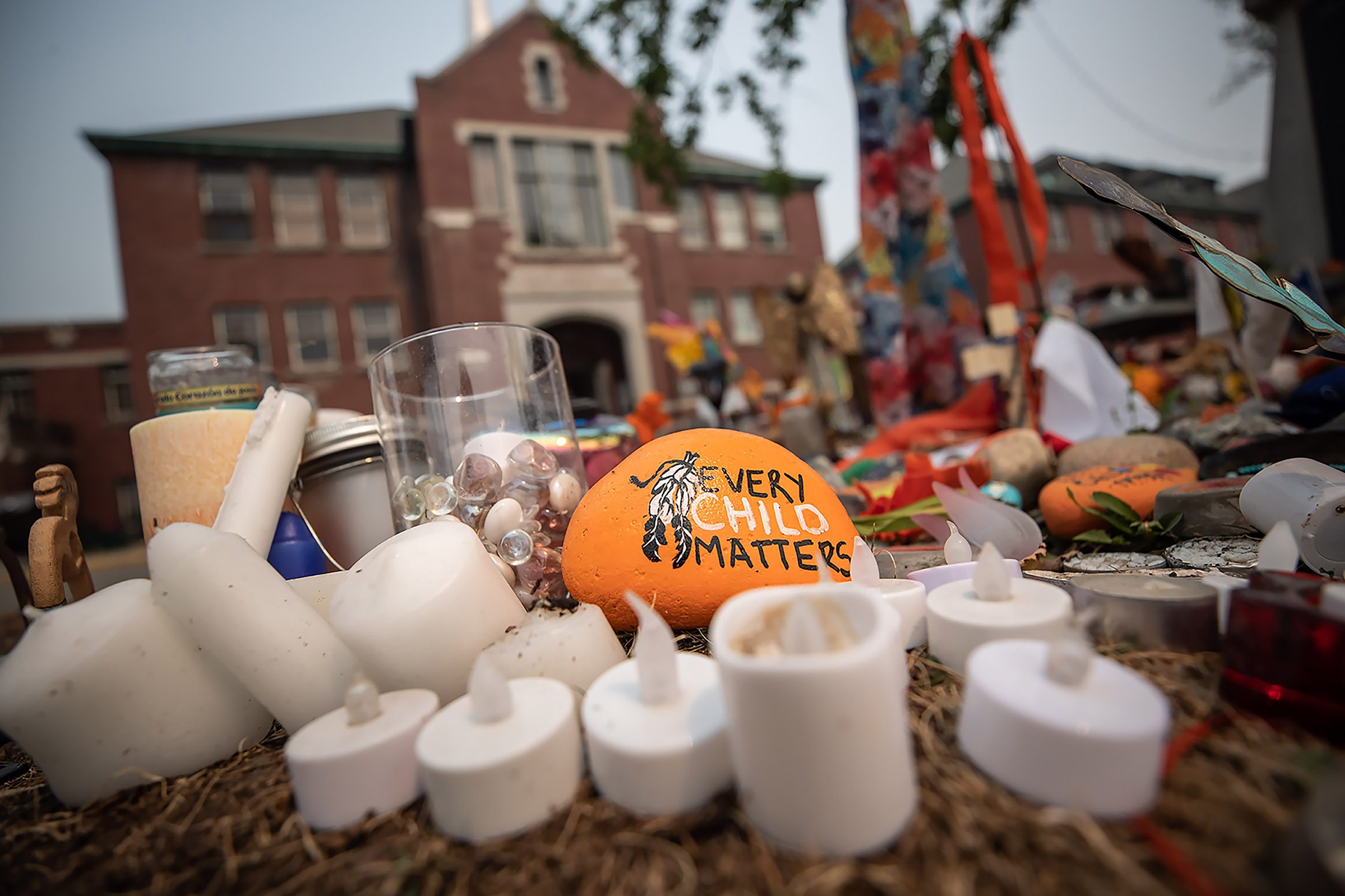
In the two years since the Tk’emlúps te Secwépemc First Nation’s 2021 announcement about the location of 215 potential unmarked graves at the former Kamloops Indian Residential School, a number of priests, pundits, and politicians have downplayed and questioned the validity of the findings. Some have declared the news of potential unmarked graves at many former residential school sites across Canada to be a “huge lie”. Others insist that mainstream media, the federal government, and First Nations have conspired to created a “hoax” by misrepresenting the news of potential unmarked burials sites as a “mass grave” to shock and guilt Canadians into caring about Indigenous Peoples and reconciliation.
Given the growing popularity of the “mass grave hoax” narrative, especially on the far-right in Canada and the United States, and recent calls for Canadians to take responsibility for countering such harmful misinformation, Reid Gerbrandt and Dr. Sean Carleton, assistant professor in history and Indigenous studies at the University of Manitoba, decided to investigate the claims of a media conspiracy and fact-check them against the evidence of what was actually reported in Canada. This report outlines their findings and recommendations.
Debunking the “Mass Grave Hoax”: A Report on Media Coverage and Residential School Denialism in Canada was released in October 2023.
Related Resources
Support Us
Whether you are passionate about interdisciplinary human rights research, social justice programming, or student training and mentorship, the University of Manitoba offers opportunities to support the opportunities most important to you.
She is Sacred: Reflections on the National Inquiry into MMIWG2S+
She is Sacred: Reflections on the National Inquiry into MMIWG2S+
October 6, 2023
Dr. Karine Duhamel, Dawn Chartrand
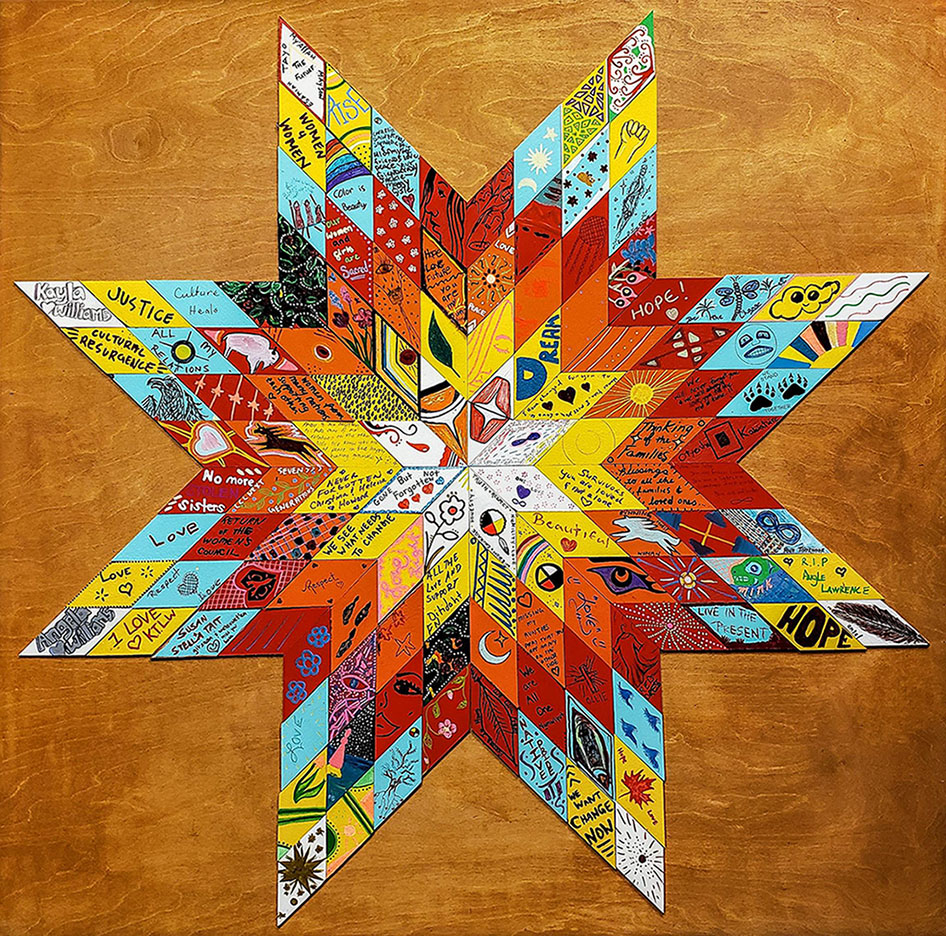
The content in this video may be difficult and/or triggering. If you or someone you know needs emotional assistance related to this topic or the information in this article, help is available 24/7 through the MMIWG Support Line, 1-866-413-6649.
On October 6, 2023, Indigenous Engagement and Communications and the Centre for Human Rights Research hosted “An Event in Honour of the National Day of Action on MMIWG2S+” with Dr. Karine Duhamel and Dawn Chartrand.
Dr. Karine Duhamel’s talk was entitled “She is Sacred: Reflections on the National Inquiry into Missing and Murdered Indigenous Women and Girls.”
Karine Duhamel is Anishinaabe-Métis and a member of Red Rock First Nation. She holds a Bachelor of Arts from Mount Allison University, a Bachelor of Education from Lakehead University and a Master’s degree and PhD in History from the University of Manitoba. From 2018 to 2019, she was Director of Research for the historic National Inquiry into Missing and Murdered Indigenous Women and Girls, drafting the Final Report, directing the Legacy Archive, and managing the Forensic Document Review Project. She is now Director of Indigenous Strategy for the Social Sciences and Humanities Research Council of Canada, working to implement the strategic plan focused on supporting Indigenous research and researchers.
Following Dr. Duhamel’s talk, we participated in a Laughing Yoga workshop with Dawn Chartrand.
Related Resources
Support Us
Whether you are passionate about interdisciplinary human rights research, social justice programming, or student training and mentorship, the University of Manitoba offers opportunities to support the opportunities most important to you.
What Wab Kinew’s win in Manitoba reveals about the province’s political history
What Wab Kinew’s win in Manitoba reveals about the province’s political history
October 4, 2023
Dr. Adele Perry

Manitoba voters have elected the NDP’s Wab Kinew as premier. His election is both a break with recent Manitoba political history and a continuation of the long history of Indigenous involvement in electoral politics in Manitoba.

Teach-In For Reconciliation
Teach-In For Reconciliation
September 29, 2023
Dr. Sean Carlton, Dr. Cary Miller Marc Kruse, Dr. Brenda Gunn
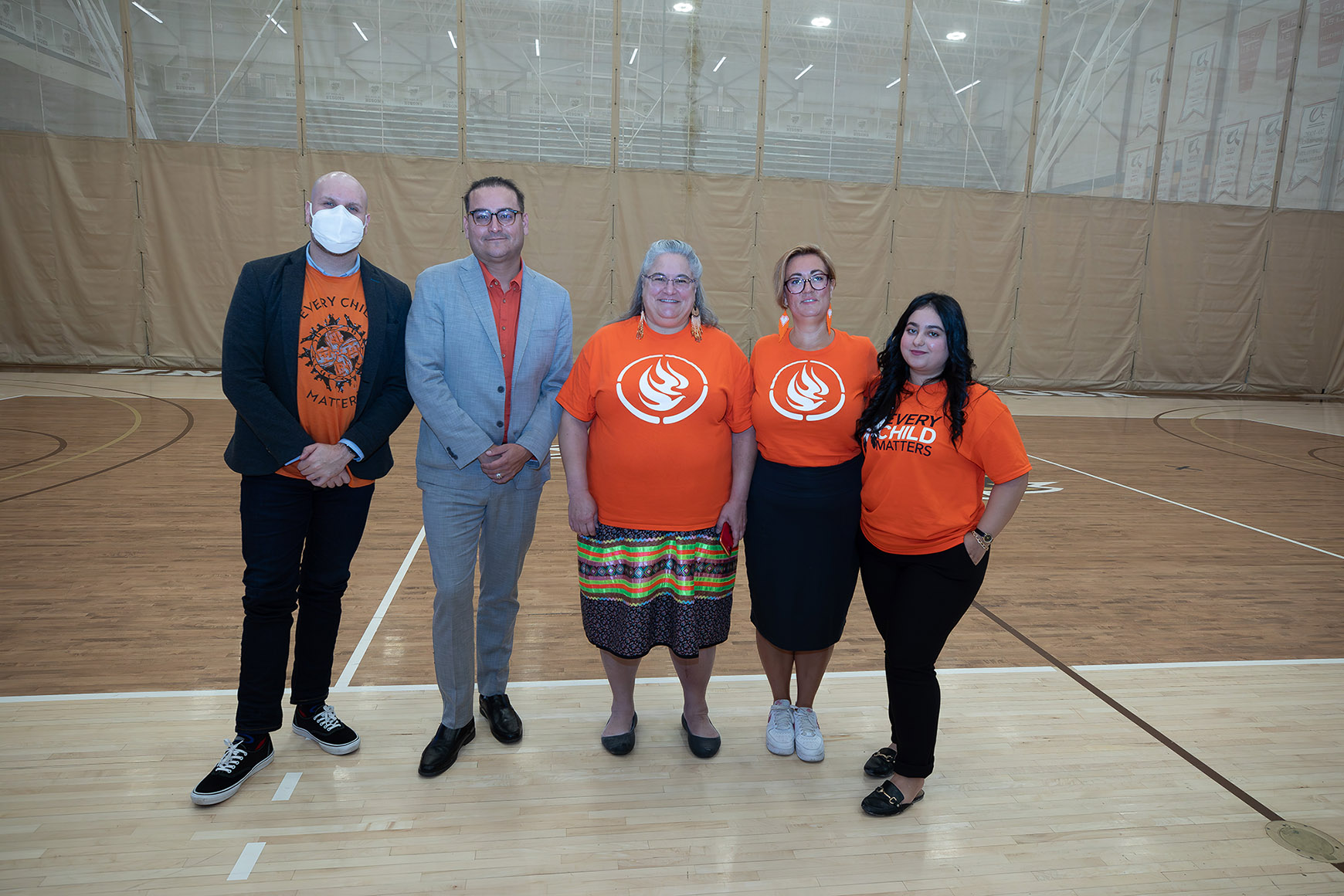
On September 29th 2023, in recognition of the National Day for Truth and Reconciliation, the Nursing Students’ Association in collaboration with the Office of the Vice-President (Indigenous), the National Centre for Truth and Reconciliation, the Centre for Human Rights Research, the University of Manitoba’s Student Union, PINE (Pathway to Indigenous Nursing Education), and the Indigenous Students’ Association will be hosting a day of events from 8:30 am to 3 pm. Part of the day’s events will include a Teach-In for Reconciliation that took place at the Investors Group Athletic Centre. The Teach-In covered topics including combating Residential School denialism; the Doctrine of Discovery and the Pope’s apology; the Peace and Friendship treaties which were formed at the Treaty of Niagara; and the Truth and Reconciliation Commission and the United Nations Declaration on the Rights of Indigenous Peoples.

Resource Hub
Doing the Work: What Settlers need to know about the Residential School System: Resource Guide
September 23, 2023
Dr. Pauline Tennent and Laura Majendaagoz . With Contributions from: Elder Betty Ross, Clayton Sandy, Dr. Sean Carleton, Dr. Brian Gettler, Dr. Erin Millions, Dr. Adele Perry, Dr. Andrew Woolford, Monique Woroniak
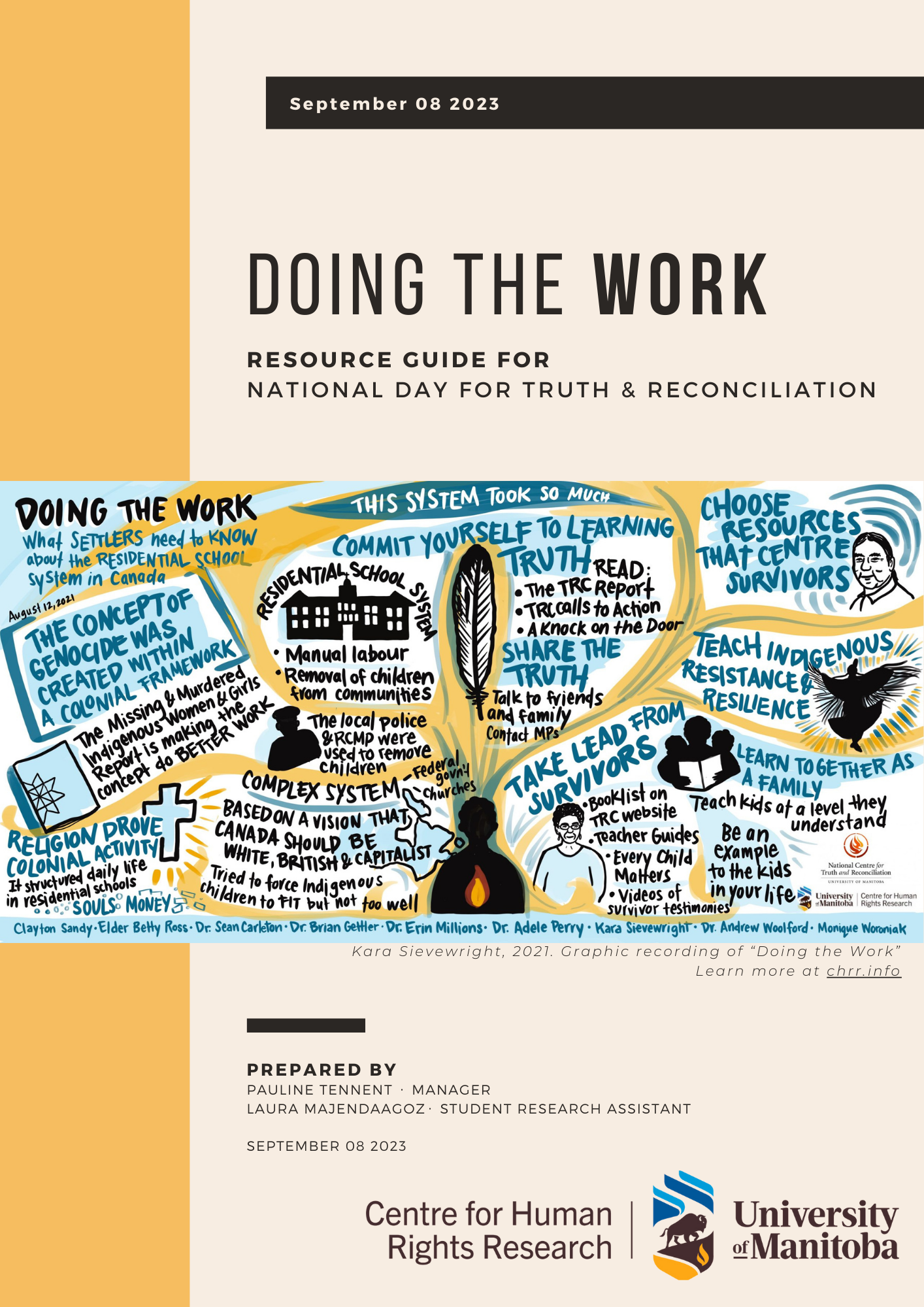
On Thursday, August 12th 2021, the Centre for Human Rights Research hosted “Doing the Work: A virtual Q & A on what settlers need to know about the residential school system in Canada.” Following the event, the panel created a resource guide, intended as a living document, with information on residential schools and the impact of colonialism in Canada. This resource guide was updated in August 2023.
Related Resources
Support Us
Whether you are passionate about interdisciplinary human rights research, social justice programming, or student training and mentorship, the University of Manitoba offers opportunities to support the opportunities most important to you.
Resource Hub
When the land hurts: Indigenous Feminism on Suicide, Environmental Violence, and the Struggle for Inhabitability
June 15, 2023
Dr. Jeffrey Ansloos
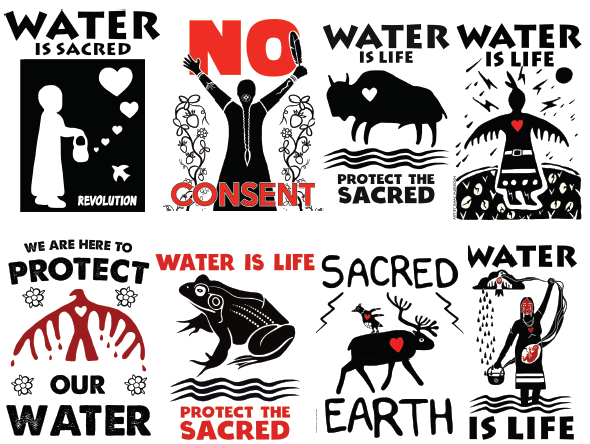
On June 15, 2023, CHRR was thrilled to host Dr. Jeffrey Ansloos for a seminar entitled “When the land hurts: Indigenous feminism on suicide, environmental violence, and the struggle for inhabitability.”

Missing the Bus
2022
Olivia Macdonald Mager, Dr. Adele Perry, Dr. Jocelyn Thorpe, Dr. Karine Duhamel

Dr. Adele Perry, Director of the Centre for Human Rights Research worked alongside Co-Investigator Jocelyn Thorpe and Collaborator Karine Duhamel in this SSHRC and Infrastructure “Knowledge Synthesis” project that examines the connections between public transit, especially intracity or long distance transit, and Indigenous women and Two-Spirit Plus people in Western Canada.

Contact Us
We’d love to hear from you.
442 Robson Hall
University of Manitoba
Winnipeg, Manitoba
R3T 2N2 Canada
204-474-6453
Quick Links
Subscribe to our mailing list for periodic updates from the Centre for Human Rights Research, including human rights events listings and employment opportunities (Manitoba based and virtual).
Land Acknowledgement
The University of Manitoba campuses are located on original lands of Anishinaabeg, Ininew, Anisininew, Dakota and Dene peoples, and on the National Homeland of the Red River Métis.
Centre for Human Rights Research 2023© · Privacy Policy

